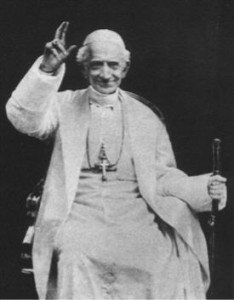I wrote several days ago something to the effect that “things are worse in the Church than people think.” This sentiment is worth qualifying and examining.
Mainly, I’d like to distinguish what I mean from what Rod Dreher means when he writes similar things. As I understand him, he sees Christian institutions under imminent attack from secularizing forces. He fears that Christians are oblivious to the seriousness of the threat. In my experience, Christians are plenty aware that demographics trends and political developments do not bode well for the Church in the immediate future. What he perhaps is responding to is the fact that few Christians make this their first concern. I don’t think that this is necessarily complacency in many cases. To explain this, let me say something about institutions.
Alasdair MacIntyre, whose famous St. Benedict quote is the inspiration for Dreher’s “Benedict Option,” is a man whose comprehensive thinking on modernity, morality, and faith deserves as much attention as one can afford. He spends almost an entire chapter on institutions in his seminal book After Virtue. Institutions are important, but should always be secondary to practices. An institution like a chess club brings together persons interested in playing chess and fostering its proper enjoyment. The club itself is not a substitute for the actual practice of playing chess. We all know that institutions tend to have their own internal logic that can often interfere with the practices they are meant to foster and protect. Therefore institutions can only function well and in proper subordination to practices if the members are virtuous. And, as MacIntyre makes clear elsewhere, virtues are learned in practices, not in the bylaws of institutions.
In my opinion, most Christians are aware that longstanding institutions are endangered. And I would agree that many of us Christians are not spending lots of time worrying about it. Ambivalence in this regard has two sources. The first is a recognition that our current institutional arrangements are often unable to surface the right kinds of virtuous leadership, and so tend to be self-defeating. The response of American bishops to the sexual abuse scandal demonstrated (and continues to demonstrate) that the institutional arrangement (meaning the current structure and operating modes) of the bishops’ conference is faulty. This is to be distinguished from the theological necessity of the episcopacy or even the virtue of individual members. Bishops could choose to organize themselves differently, but this would require hard thinking about the precise practices that the bishops’ conference is meant to foster and protect. The Council documents that encouraged the formation of these institutions are somewhat vague on this point and were, perhaps, slightly naive about how institutions can corrupt practices.
The second source of ambivalence stems from the typical Christian concentration on real practices. This is to say that the average Christian is more concerned about the practice of virtue at ground level than the institutional backing that supposedly is undergirding it. Another way to look at this is to say that Christians are already developing their own local, ad hoc institutions (which is what the Benedict Option is supposed to encourage). The collapse of larger structures that provide tax shelter for a religious soup kitchen may or may not impact the soup kitchen itself. But Christians will, in one way or another, find a way to feed the hungry. It’s what we do. And I see so much of this in my everyday life, even from the relative obscurity of the cloister, that it seems ungrateful to fret about difficulties to come, even while I do see the need to prepare for them. I’d rather point to the exercise of faith around me and encourage the Christians I know to continue the work of virtue than worry about something that hasn’t happened yet, and may or may not in fact happen. This work is being done by the laity, a visible fruit of the teaching of Vatican II.
Last of all, the mention of virtue brings me at last to explain what I mean when I say that things are worse than people might think. What I mean by this is that our Western culture, especially in America, has been somewhat less-than-fully-Christian for many generations now, and that reviving a genuine, thoroughgoing practice of Christian virtue is a lot more difficult than the average person might think. This is something I can vouch for firsthand. I am a cradle Catholic who has mostly practiced by faith all my life. And yet, I am continually amazed at how far I have to go to be genuinely holy. Now, putting it that way illustrates that this is not pessimism or frustrating, or even necessarily cause for great fear. If you read the lives of the saints, you will discover that most saints had this same experience (which does not make me a saint, by the way). Love of a transcendent God means, in the words of Fr. Michael Casey, being perpetually out of one’s depth. Where I think there is some naivete is in our American optimism that “most people are basically good.” This is a nice, generous sentiment. But it does not help us to gain a lot of energy in the spiritual battle, in which we must first notice that in every heart there are large swaths of unevangelized heathendom. These are, of course, open to hearing the Good News! Which makes them, in their way, “good,” if broken and in need of healing. This healing is what we must first be about, and only if this happens will institutional reform follow in any meaningful way. In the short term, this may mean the tottering and elimination of many institutions. Some may be sad to see them go. But the long-term needs of the Faith may require this purification.

